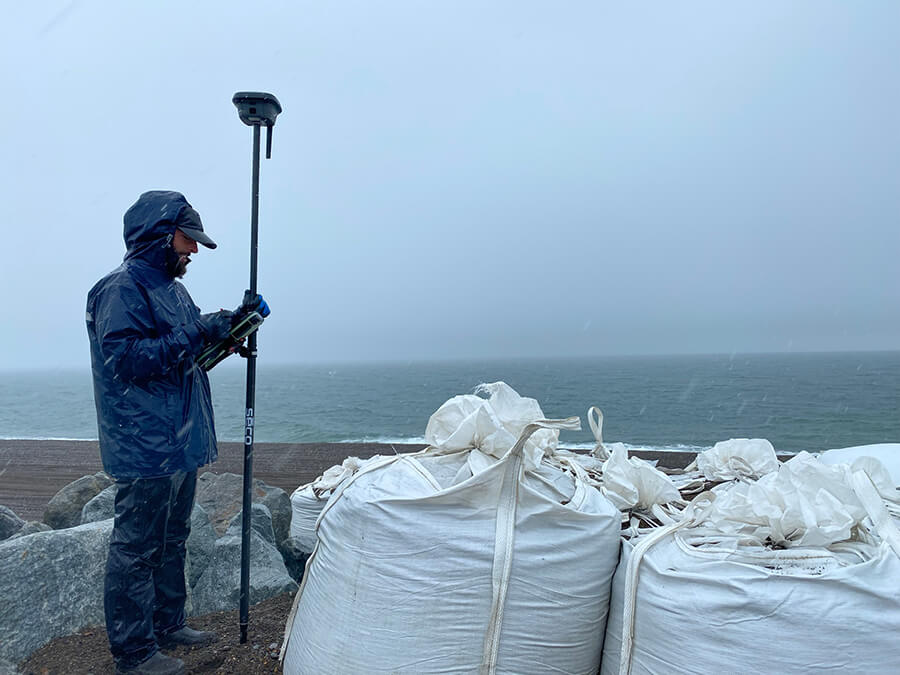It’s more important than ever for organizations to understand and adopt environmental, social, and corporate governance (ESG) commitments, and take action to deliver a better world. We’re here to partner with you at every stage, from concept to design and delivery. At EA, we are 100% focused on the environment. Our ESG advisory teams are integrated professionals that help public and private leaders assess the environmental and social issues facing their organizations and develop strategies to address these for long-term business resilience.
Holistic Approach
 Strategic Advisory
Strategic Advisory
- Strategy development, including materiality assessment facilitation and documentation
- ESG risk screening
- Benchmarking
- Gap assessment and audits
- Strategy processing and framework training/coaching
- Objective, goal, and target setting and alignment with voluntary commitments
- Action plans and playbooks
Technical Advisory | Water, Carbon, Climate, Materials
- Footprint analysis (facility, portfolio, and product) (e.g., greenhouse gas [GHG])
- Subject matter expertise
- Data management and analytics
- Resilience and vulnerability assessments
Reporting and Disclosure Support
- Third-party disclosure development (e.g., GRI, SDG, CDP, SASB, etc.)
- Sustainability, Corporate Social Responsibility, and ESG Annual Reports
- Stakeholder communication campaigns
Creating an ESG Strategy
ESG is a range of topics used to measure how a business interacts with society and the environment. It’s more than investment, it also frames the strategy of the organization. If you’re not sure where to begin, our ESG advisory team can work with you to create an ESG strategy that is customized to your organization, actionable, and aligned to your goals. Our team can assist in unpacking the opportunities, helping you take the first step, and offering support every step of the way.
We use proven tools and approaches:
- Materiality Assessment—Defines material ESG topics and risks to the organization, including key stakeholders.
- Scenario Planning—Helps organizations “peek around the corner” and proactively anticipate future state through works sessions.
- Benchmarking—From in-sector and out-of-sector, helps draw best practices, lessons learned, and industry perspectives for consideration.
- Gap Assessment—Helps assess, design, implement, and sustain leading management systems integrating recognized standards and client organizational standards. We meet you “where you are” to implement realistic solutions that meet organizational, stakeholder, and third-party industry standards (e.g., ISO).
Improving E and S Impact
Our expertise across energy transition, asset management and decarbonization, portfolio resilience, and adaptation; integration of nature-based solutions (NBS); and environmental restoration helps you improve your “E” and “S” impact. NBS are sustainable planning, design, environmental management, and engineering practices that weave natural features or processes into the built environment to promote adaptation and resilience. We employ NBS to identify, minimize, and recover from the impacts of climate change while working to create a more resilient, biodiverse, and sustainable world. We’re working directly with leading public agencies and the academic community on solutions.
Moving to Net Zero
We can help you achieve your net zero carbon targets by creating net zero roadmaps, implementing energy transition strategies, and adopting NBS. We meet you “where you are” to develop realistic and achievable plans.
Strengthening Climate Change Adaptation and Resilience
We can help you understand future climate risk and how to prioritize adaptation strategies and increase resilience for the most vulnerable and critical parts of your organization.
ESG Accreditations
EA professionals hold accreditations for various ESG-related market areas:
Energy. EA is an Approved Assessor for the EO100 TM Standard for Responsible Energy Development. Developed by Equitable Origin, the certification evaluates site-level ESG performance of energy and energy infrastructure projects for performance-beyond-emissions, and it considers corporate governance, transparency, and ethics; human rights; social impact and community development; indigenous peoples’ rights; fair labor and working conditions; and climate change, biodiversity, and environment. Read more about the EO100™ Standard for Responsible Energy Development.
Maritime. EA is an Approved Verifier and Partner for the Green Marine. EA provides third-party reporting/attestation reviews for Green Marine verification at maritime facilities. Green Marine is a voluntary, transparent, and inclusive ESG certification program for marine facilities throughout North America. Participating shipowners, ports, terminals, Seaway corporations, and shipyards maintain certification by reporting 12 environmental performance indicators that document their continuous efforts to reduce their environmental footprint. An annual self-assessment that benchmarks their performance is then externally reviewed by a third-party verifier biennially. Each year, they benchmark their environmental performance through a Green Marine self-assessment of ESG performance, which is externally verified by an EA third-party verifier biannually.
Other ESG-related certifications EA staff hold:
- TRUE program for zero waste certification TRUE Advisor Certificate Program
- Institute for Sustainable Infrastructure (civil infrastructure) Envision Sustainability Professional (ENV SP)
- Certified Energy Manager (CEM)
- Certified Climate Change Professional (CC-P)
- LEED
Case Studies
Energy Transition Client
EA completed a gap assessment, design, and implementation of an ISO-based EHS management system for the client as part of their ESG roadmap interacting with senior leadership.
National Park Service
Under a multi-year contract, EA provides National Park Service with coastal engineering support to review engineering documents, assess potential hazards and vulnerability, and address resilience at sites nationwide.
Learn More about this National Park Service Work
GHG Footprint for Confidential Energy Client
EA developed a GHG emission footprint for a North American energy development, investment, and operating company focused on power generation, electric transmission, and energy infrastructure, including four subsidiary companies. The footprint was developed in accordance with EPA’s World Resources Institute GHG protocol including a GHG Inventory Management Plan to account for all process and emission sources. The effort was integrated into the client’s ESG and voluntary reporting strategy.
Department of Defense Cultural Resources
For the Department of Defense, EA developed a Climate Adaptation Guide for the diverse cultural resources located on military installations within the United States, providing guidance on identifying appropriate adaptation strategies and then integrating them into installation Integrated Cultural Resources Management Plans (ICRMPs). The guide addresses potential risks and effects of extreme weather as well as resulting concerns related to infrastructure, cultural resources, and environmental compliance.
Learn More about the Climate Adaptation Guide
Cold Region Coastal Resilience
 With an elevation of just 13-18 feet above mean sea level at its highest points, the city of Point Hope, Alaska is highly vulnerable to the effects of climate change, especially sea level rise, loss of shore-fast sea ice and permafrost, and increases in the size of storm surges, which are all accelerating erosion. Under a grant from the National Fish and Wildlife Foundation’s National Coastal Resilience Fund and matching funds from the North Slope Borough, the City of Point Hope is evaluating opportunities for nature-based projects to protect critical infrastructure and cultural resources to help improve its resilience for generations to come. EA is actively supporting the effort through scientific data collection, traditional ecological knowledge data collection, vulnerability assessments, and the development of engineering designs related to coastal resilience and adaptation.
With an elevation of just 13-18 feet above mean sea level at its highest points, the city of Point Hope, Alaska is highly vulnerable to the effects of climate change, especially sea level rise, loss of shore-fast sea ice and permafrost, and increases in the size of storm surges, which are all accelerating erosion. Under a grant from the National Fish and Wildlife Foundation’s National Coastal Resilience Fund and matching funds from the North Slope Borough, the City of Point Hope is evaluating opportunities for nature-based projects to protect critical infrastructure and cultural resources to help improve its resilience for generations to come. EA is actively supporting the effort through scientific data collection, traditional ecological knowledge data collection, vulnerability assessments, and the development of engineering designs related to coastal resilience and adaptation.
